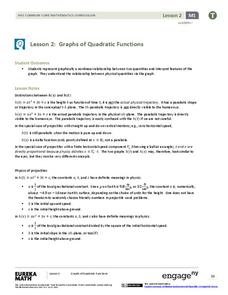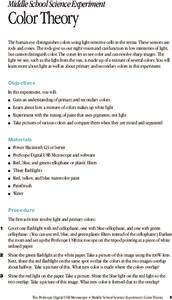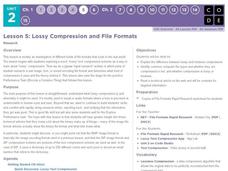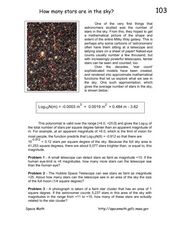EngageNY
Graphs of Quadratic Functions
How high is too high for a belly flop? Learners analyze data to model the world record belly flop using a quadratic equation. They create a graph and analyze the key features and apply them to the context of the video.
PBS
Lesson Plan: “Seeing the Way: A Brief History of Cataract Surgery”
After looking at the history of cataract surgery techniques, your high schoolers will have a new perspective on medical and scientific advances. Kids alternate between watching short video clips, class discussion, and computer research....
NASA
Collecting Electromagnetic Radiation
Astronomy is literally over your head, but this lesson will explain how we study it. Young scientists make telescopes, calculate and compare the light gathering power of lenses, and simulate detection of infared radiation....
Curated OER
The Five Senses
Students recognize how each of the five senses works and define the related terminology. They compare and contrast the means by which the senses gather information about the world. In addition, they research how an assigned sense works...
Huntington Library
Light in Painting
How do painters use and manipulate light in their artwork to give emphasis and establish mood and emotion? Pupils will analyze a few examples of landscape and portrait painting in order to explore the how light is used in art,...
Cornell University
Light Waves: Grades 9-12
Explore the behavior of light waves with a lab activity. Scholars build new vocabulary through experimentation and observation. Using different mediums, they model reflection, refraction, transmission, diffusion, and scattering of light.
Facing History and Ourselves
Emmett Till: Connecting the History of Lynching to The Murder
Though the murder of Emmett Till shocked 1950's America into turning attention to the racial crimes of the South, it was far from the first time racism had erupted into violence. High schoolers examine the killing in context with the...
Curated OER
Color Theory
Students are able to gain an understanding of primary and secondary colors. They are able to explore about how a mixture of colors makes up white light. Students are able to experiment with the mixing of paint that uses pigments, not...
Curated OER
Germs and the Importance of Washing Your Hands
Students observe what happens when bread is handled by dirty hands. They read and discuss the book "Germs." Students participate in an experiment. Students touch bread with a variation of hands: dirty, washed with soap and water, washed...
Curated OER
Simple Preparation Can Improve Reading Comprehension
Reading comprehension is key to success in nearly every subject in school, but how do you improve comprehension in a pupil with dyslexia? Here are several tips that define ways in which educators can provide strategies to improve overall...
Code.org
Lossy Compression and File Formats
I'm compressed. Groups do a rapid research of different file types to determine what kind of compression the formats use and how it works. They share their information with the rest of the class until everyone has all the information for...
Glynn County School System
Multi-Wavelength Astronomy
Take a look at astronomy through the light lens. From radio to gamma, light waves exist in every corner of the universe. An enlightening PowerPoint presentation gives an overview of the different categories of light and then discusses...
Sunlight Cal-Tech
Chromatography of Plant Pigments
Through a hands-on activity, an acetone-spinach solution is pre-made and learners use this solution to separate the pigments found in spinach using chromatography. The comprehensive resource includes an analysis and conclusion...
Cornell University
Light Waves: Grades 6-8
Explore the behavior of light with different materials. Collaborative groups determine whether certain materials absorb, reflect, diffract, or transmit light waves. They then measure the angle of incidence and angle of reflection.
Curated OER
Catch a Wave. . .
Part of a larger online space science website, this page has a brief explanation of electromagnetic radiation and a chart of wavelengths as compared to common objects. There are four questions to answer about the information. This can be...
Curated OER
English Vocabulary Skills: AWL Sublist 9 - Exercise 3b
In this online interactive English vocabulary skills instructional activity, students answer 10 matching questions which require them to fill in the blanks in 10 sentences. Students may submit their answers to be scored.
Curated OER
Sorting
Learners explore how to sort and manage information. In this organization lesson students complete an activity on sorting.
Curated OER
Religious Crusades
In this religious Crusades worksheet, students respond to 2 questions that require them to write paragraphs about the effects of the Crusades. Students also examine a map of the wars and respond to short answer questions.
NASA
Star Brightness
In this brightness of stars worksheet, high schoolers answer 7 questions about the apparent magnitudes of stars, the sun, and the moon. They compare the brightness of stars, galaxies, astronomical objects and the sun.
Curated OER
Create Your Own Ad
Students examine the elements of advertising. They analyze the format and structure of advertisements. They develop awareness of advertising techniques and explain that media messages and products are composed of a series of separate...
Curated OER
Stars and The Modern Telescope
In this stars and the modern telescope worksheet, students use a photograph taken by the 2MASS telescope to calculate the number of bright stars and faint stars in the picture, the size of the picture, and the number of stars expected to...
Curated OER
How Many Stars are in the Sky?
In this star count worksheet, students solve three problems using a given polynomial and its logarithm to determine the number of stars in a given area.
Curated OER
Math and the Greek-Golden Proportions
Fourth graders study math and the golden mean. For this math meets Greek history lesson, 4th graders study ratios and proportions in relation to the Greeks. The use of clay is incorporated ino this lesson.
Curated OER
The Golden Ratio
Seventh graders investigate a ratio found in nature and in numerous pieces of artwork throughout history. The lesson is cross-curricular and builds a sense of appreciation of design for students.























